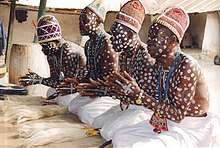Trinidad Orisha
Trinidad Orisha, also known as Shango, is a syncretic religion in Trinidad and Tobago and is of Caribbean origin, originally from West Africa (Yoruba religion). Trinidad Orisha incorporates elements of Spiritual Baptism, and the closeness between Orisha and Spiritual Baptism has led to use of the term "Shango Baptist" to refer to members of either or both religions. Anthropologist James Houk described Trinidad Orisha as an "Afro-American religious complex",[1] incorporating elements mainly of traditional African religion and Yoruba and incorporates some elements of Christianity (Catholicism and Protestantism), Hinduism, Islam (especially Sufism), Buddhism, Judaism, Bahá'í, and Trinidad Kabbalah.
| Part of a series on |
| Yoruba religion (Òrìṣà-Ifá) |
|---|
 |
|
Variants
|
|
Sacred sites |
|
Legendary figures |
Ritual music
Trinidad Orisha practice involves call-and-response singing accompanied by a trio of drums. Orisha drums are double-headed bi-tensorial cylinders derived from Yoruba bembe drums (similar to the Cuban Iyesá drums). The drum that is lowest in pitch is called the bo or kongo. The lead drum is called "center drum," "big drum," or bembe. The smallest drum, highest in pitch, is called umele. The first two drums are played with a single stick plus hand combination, while the umele is played with a pair of sticks. All of the sticks are curved at the end, and resemble a shepherd's staff or crook.[2] The language of the songs has been referred to as "Trinidad Yoruba"[3] and is derived from the Yoruba language.
References
- Houk, James (1995). Spirits, Blood, and Drums: The Orisha Religion in Trinidad. Philadelphia, PA: Temple University Press.
- Bazinet, Ryan (2012). "Shango Dances Across the Water: Music and the Re-Construction of Trinidadian Orisha in New York City". In Kamille Gentles-Peart and Maurice L. Hall (ed.). Re-Constructing Place and Space. Cambridge Scholars Publishing.
- Warner-Lewis, Maureen (1996). Trinidad Yoruba: From Mother Tongue to Memory. Tuscaloosa: University of Alabama Press.